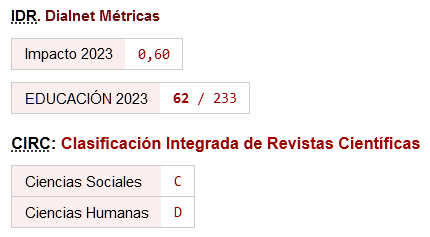Teachers' well-being in times of Covid-19 pandemic: factors that explain professional well-being
DOI:
https://doi.org/10.46661/ijeri.5120Keywords:
COVID-19, Teachers, Well-being, Job satisfaction, future perspectivesAbstract
This cross-sectional study was aimed to describe and analyse factors related to the professional well-being of Portuguese teachers during the COVID-19 pandemic. A previously validated, anonymous and online questionnaire was applied to a non-probabilistic sample of Portuguese teachers. In addition to the socio-demographic and professional variables, the questionnaire measured subjective and professional well-being, satisfaction with the education system and future perspectives regarding the professional circumstances. The psychometric characteristics of the questionnaire were analysed, the t-test and ANOVA were used to analyse the differences between the main variables and the socio-demographic and professional characteristics, along with the generalized linear model in order to more precisely determine the predicting factors of teachers' professional well-being. The results showed that the majority of respondents have a moderately positive perception of well-being. Teachers were satisfied with the education system before the pandemic. The pandemic has reduced the perception of well-being in the face of the profession, creating some concern among teachers about their professional future. Sex, length of service, well-being, perceptions of teaching difficulties and future perspectives proved to be predictors of professional well-being in times of pandemic. This study provided scientific bases for the development of interventions that improve the professional well-being of teachers, which focus on emotional management and the development of digital skills in teachers with long careers. This piece of research concluded with thorough evidence that there is a need for further and stronger investment in public policies for the reform and, consequently, for the renewal of the teaching class.
Downloads
References
Alves, R. F., Precioso, J. A. G., & Becona, E. (2020). Well-being and health perception of university students in Portugal: the influence of parental support and love relationship. Health Psychology Report, 8(2), 145–154. https://doi.org/10.5114/hpr.2020.94723
Azevedo, J., Veiga, J., & Ribeiro, D. (2016). As preocupações e motivações dos professores: apresentação dos resultados de um inquérito (Fundação M). Vila Nova de Gaia, Portugal.
Aziri, B. (2011). Job satisfaction: a literature review. Management Research and Practice, 3(4), 77–86.
Becker, E. S., Goetz, T., Morger, V., & Ranellucci, J. (2014). The importance of teachers’ emotions and instructional behavior for their students’ emotions - An experience sampling analysis. Teaching and Teacher Education, 43, 15–26. https://doi.org/10.1016/j.tate.2014.05.002
Briones, P. E., Urbieta, T. C., & Arenas, M. A. (2010). Job Satisfaction of Secondary School Teachers: Effect of Demographic and Psycho-Social Factors. Revista de Psicología Del Trabajo y de Las Organizaciones, 26(2), 115–122. https://doi.org/10.5093/tr2010v26n2a3
Bullough, R. V., Hall-Kenyon, K. M., & MacKay, K. L. (2012). Head Start Teacher Well-Being: Implications for Policy and Practice. Early Childhood Education Journal, 40(6), 323–331. https://doi.org/10.1007/s10643-012-0535-8
Çevik, G. B. (2017). The Roles of Life Satisfaction, Teaching Efficacy, and Self-esteem in Predicting Teachers’ Job Satisfaction. Universal Journal of Educational Research, 5(3), 338–346. https://doi.org/10.13189/ujer.2017.050306
Chan, D. W. (2006). Emotional intelligence and components of burnout among Chinese secondary school teachers in Hong Kong. Teaching and Teacher Education, 22(8), 1042–1054. https://doi.org/10.1016/j.tate.2006.04.005
Christensen, L. B., Johnson, B., & Turner, L. A. (2015). Research methods, design, and analysis. Boston: Pearson.
Collie, R. J., Shapka, J. D., Perry, N. E., & Martin, A. J. (2015). Teacher Well-Being: Exploring Its Components and a Practice-Oriented Scale. Journal of Psychoeducational Assessment, 33(8), 744–756. https://doi.org/10.1177/0734282915587990
Demirel, H. (2014). An investigation of the relationship between job and life satisfaction among teachers Selection and peer review under the responsibility of Prof. Dr. Servet Bayram. Procedia-Social and Behavioral Sciences, 116, 4925–4931. https://doi.org/10.1016/j.sbspro.2014.01.1051
Diener, E., Lucas, R. E., & Oishi, S. (2018). Advances and Open Questions in the Science of Subjective Well-Being. Collabra: Psychology, 4(1), 15. https://doi.org/10.1525/collabra.115
Feng, B. (2007). A study of teacher job satisfaction and factors that influence it. Chinese Education and Society, 40(5), 47–64. https://doi.org/10.2753/CED1061-1932400506
Furtado, S. C. O., & Medeiros, T. (2017). Subjective well-being of teachers in pre-retirement. Revista de Estudios e Investigación En Psicología y Educación, 4(2), 99. https://doi.org/10.17979/reipe.2017.4.2.1889
Garrick, A., Mak, A. S., Cathcart, S., Winwood, P. C., Bakker, A. B., & Lushington, K. (2018). Non-Work Time Activities Predicting Teachers’ Work-Related Fatigue and Engagement: An Effort-Recovery Approach. Australian Psychologist, 53(3), 243–252. https://doi.org/10.1111/ap.12290
Goroshit, M., & Hen, M. (2016). Teachers’ empathy: can it be predicted by self-efficacy? Teachers and Teaching: Theory and Practice, 22(7), 805–818. https://doi.org/10.1080/13540602.2016.1185818
Gursel, M., Sunbul, A. M., & Sari, H. (2002). An analysis of burnout and job satisfaction between Turkish headteachers and teachers. European Journal of Psychology of Education, 17(1), 35–45. Retrieved from http://www.jstor.com/stable/23421427
Harding, S., Morris, R., Gunnell, D., Ford, T., Hollingworth, W., Tilling, K., … Kidger, J. (2019). Is teachers’ mental health and wellbeing associated with students’ mental health and wellbeing? Journal of Affective Disorders, 242, 180–187. https://doi.org/10.1016/j.jad.2018.08.080
Hongying, S. (2007). Literature Review of Teacher Job Satisfaction. Chinese Education & Society, 40(5), 11–16. https://doi.org/10.2753/CED1061-1932400502
Huang, S., & Yin, H. (2018). Teacher Efficacy and Affective Well-Being in Hong Kong: An Examination of Their Relationships and Individual Differences. ECNU Review of Education, 1(2), 102–126. https://doi.org/10.30926/ecnuroe2018010205
Inandi, Y., Tunç, B., & Uslu, F. (2013). Relationship between job satisfaction and career barriers for the academic staff of the education faculties. Journal of Educational Sciences Research, 3(1), 219–238. https://doi.org/10.12973/jesr.2013.3112a
Inchley, J. C., Currie, D., Budisavljevic, S., Torsheim, T., Jåstad, A., Cosma, A., … Arnarsson, Á. M. (2020). Spotlight on adolescent health and well-being. Findings from the 2017/2018 Health Behaviour in School-aged Children (HBSC) survey in Europe and Canada. International report. Volume 1. Key findings. (Vol. 1). Copenhagen. Retrieved from www.euro.who.int
Jensen, B., Sandoval-Hernández, A., Knoll, S., & Gonzalez, E. J. (2012). The Experience of New Teachers: Results from TALIS 2008 (TALIS). OECD. https://doi.org/10.1787/9789264120952-en
Katrin Arens, A., & Morin, A. J. S. (2016). Relations between teachers’ emotional exhaustion and students’ educational outcomes. Journal of Educational Psychology, 108(6), 800–813. https://doi.org/10.1037/edu0000105
Kidger, J., Brockman, R., Tilling, K., Campbell, R., Ford, T., Araya, R., … Gunnell, D. (2016). Teachers’ wellbeing and depressive symptoms, and associated risk factors: A large cross sectional study in English secondary schools. Journal of Affective Disorders, 192, 76–82. https://doi.org/10.1016/j.jad.2015.11.054
Klassen, R. M., & Chiu, M. M. (2010). Effects on Teachers’ Self-Efficacy and Job Satisfaction: Teacher Gender, Years of Experience, and Job Stress. Journal of Educational Psychology, 102(3), 741–756. https://doi.org/10.1037/a0019237
Konu, A., Viitanen, E., & Lintonen, T. (2010). Teachers’ wellbeing and perceptions of leadership practices. International Journal of Workplace Health Management, 3(1), 44–57. https://doi.org/10.1108/17538351011031939
Kotaman, H. (2016). Turkish early childhood teachers’ emotional problems in early years of their professional lives. European Early Childhood Education Research Journal, 24(3), 365–381. https://doi.org/10.1080/1350293X.2014.970849
Kurt, N., & Demirbolat, A. O. (2019). Investigation of the Relationship Between Psychological Capital Perception, Psychological Well-Being and Job Satisfaction of Teachers. Journal of Education and Learning, 8(1). https://doi.org/10.5539/jel.v8n1p87
Kyriacou, C. (2001). Teacher stress: Directions for future research. Educational Review, 53(1), 27–35. https://doi.org/10.1080/00131910120033628
Mattern, J., & Bauer, J. (2014). Does teachers’ cognitive self-regulation increase their occupational well-being? The structure and role of self-regulation in the teaching context. Teaching and Teacher Education, 43, 58–68. https://doi.org/10.1016/j.tate.2014.05.004
McInerney, D. M., Korpershoek, H., Wang, H., & Morin, A. J. S. (2018). Teachers’ occupational attributes and their psychological wellbeing, job satisfaction, occupational self-concept and quitting intentions. Teaching and Teacher Education, 71, 145–158. https://doi.org/10.1016/j.tate.2017.12.020
Mehdinezhad, V. (2012). Relationship between High School teachers’ wellbeing and teachers’ efficacy. Acta Scientiarum. Education, 34(2). https://doi.org/10.4025/actascieduc.v34i2.16716
Moè, A., Pazzaglia, F., & Ronconi, L. (2010). When being able is not enough. The combined value of positive affect and self-efficacy for job satisfaction in teaching. Teaching and Teacher Education, 26(5), 1145–1153. https://doi.org/10.1016/j.tate.2010.02.010
Puertas Molero, P., Zurita Ortega, F., Ubago Jiménez, J. L., & González Valero, G. (2019). Influence of Emotional Intelligence and Burnout Syndrome on Teachers Well-Being: A Systematic Review. Social Sciences, 8(6), 185. https://doi.org/10.3390/socsci8060185
Pulido-Martos, M., Lopez-Zafra, E., Estévez-López, F., & Augusto-Landa, J. M. (2016). The Moderator Role of Perceived Emotional Intelligence in the Relationship between Sources of Stress and Mental Health in Teachers. Spanish Journal of Psychology, 19. https://doi.org/10.1017/sjp.2016.8
Reimer, F. M., & Schleicher, A. (2020). Schooling Disrupted, Schooling Rethought: How the Covid-19 pandemic is changing education.
Sahito, Z., & Vaisanen, P. (2020). A literature review on teachers’ job satisfaction in developing countries: Recommendations and solutions for the enhancement of the job. Review of Education, 8(1), 3–34. https://doi.org/10.1002/rev3.3159
Sisask, M., Värnik, P., Värnik, A., Apter, A., Balazs, J., Balint, M., … Wasserman, D. (2014). Teacher satisfaction with school and psychological well-being affects their readiness to help children with mental health problems. Health Education Journal, 73(4), 382–393. https://doi.org/10.1177/0017896913485742
Skaalvik, E. M., & Skaalvik, S. (2015). Job satisfaction, stress and coping strategies in the teaching profession-what do teachers say? International Education Studies, 8(3), 181–192. https://doi.org/10.5539/ies.v8n3p181
Spector, P. (1997). Job Satisfaction: Application, Assessment, Causes, and Consequences. 2455 Teller Road, Thousand Oaks California 91320 United States: SAGE Publications, Inc. https://doi.org/10.4135/9781452231549
Spilt, J. L., Koomen, H. M. Y., & Thijs, J. T. (2011, December 12). Teacher Wellbeing: The Importance of Teacher-Student Relationships. Educational Psychology Review. Springer. https://doi.org/10.1007/s10648-011-9170-y
Tang, Y. (2018). What makes rural teachers happy? An investigation on the subjective well-being (SWB) of Chinese rural teachers. International Journal of Educational Development, 62, 192–200. https://doi.org/10.1016/j.ijedudev.2018.05.001
Virtanen, A., De Bloom, J., & Kinnunen, U. (2020). Relationships between recovery experiences and well-being among younger and older teachers. International Archives of Occupational and Environmental Health, 93(2), 213–227. https://doi.org/10.1007/s00420-019-01475-8
Yildirim, K. (2015). Testing the main determinants of teachers’ professional well-being by using a mixed method. Teacher Development, 19(1), 59–78. https://doi.org/10.1080/13664530.2014.970663
Yin, H. biao, Lee, J. C. K., Zhang, Z. hua, & Jin, Y. le. (2013). Exploring the relationship among teachers’ emotional intelligence, emotional labor strategies and teaching satisfaction. Teaching and Teacher Education, 35, 137–145. https://doi.org/10.1016/j.tate.2013.06.006
Yorulmaz, Y. I., Colak, I., & Altinkurt, Y. (2017). A Meta-Analysis of the Relationship Between Teachers’ Job Satisfaction and Burnout. Eurasian Journal of Educational Research, 17(71), 175–192. https://doi.org/10.14689/ejer.2017.71.10
Zacher, H., & Schmitt, A. (2016). Work Characteristics and Occupational Well-Being: The Role of Age. Frontiers in Psychology, 7. https://doi.org/10.3389/fpsyg.2016.01411
Downloads
Published
How to Cite
Issue
Section
License
Copyright (c) 2020 Regina Alves, Teresa Lopes, José Precioso

This work is licensed under a Creative Commons Attribution-NonCommercial-NoDerivatives 4.0 International License.











